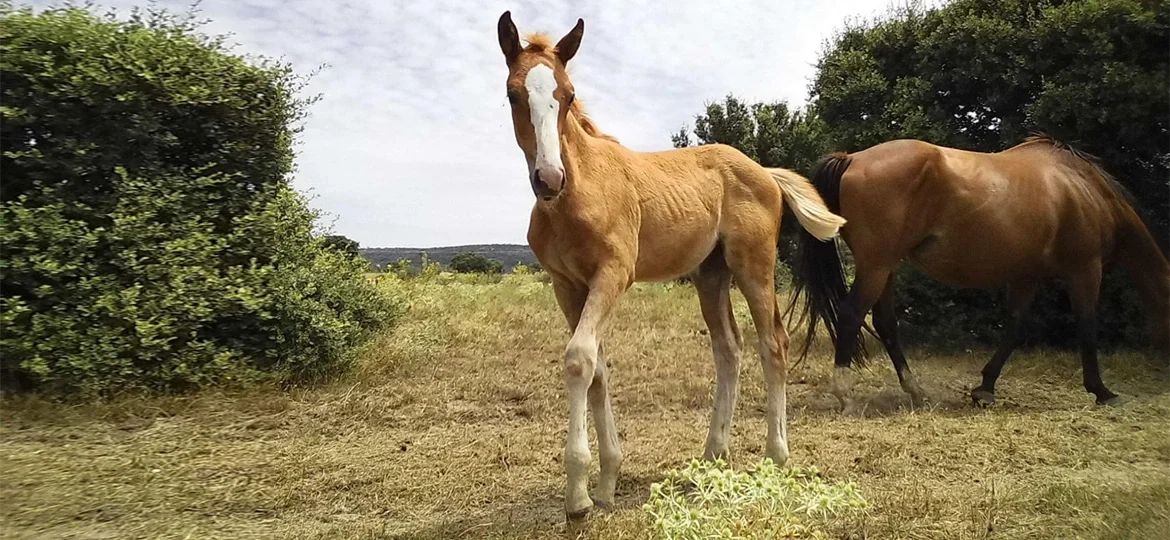
The first six months of a foal’s life are essential in ensuring good health and development for the rest of its life. During this time, they experience rapid physical growth, develop their immune system, and undergo major changes in their behaviour and health.
The most important factors to consider are outlined below:
– FEEDING:
The mare’s milk should be the foal’s main source of nutrition during its first few weeks of life. It contains all the nutrients necessary for growth, development, and strengthening of the immune system. It’s important to observe the foal in the first few hours after birth to ensure that it’s ingesting colostrum. This is the first milk produced by the mare, and is the richest in nutrients, energy and antibodies.
If the dam is unable to provide sufficient milk, supplementation with artificial milk may be used. This milk should be specifically formulated for foals and administered according to the vet’s instructions. It’s important to avoid overfeeding, as this can cause digestive, physical, musculoskeletal and developmental problems.
At 2-3 weeks of age, the foal will begin to show interest in other types of food, although its main food will continue to be mother’s milk.
Weaning usually takes place between four and six months of age, although this depends on the breeder and, of course, the mare and foal. Good quality hay should be offered at weaning to allow the foal to develop its digestive system. As the foal grows, forage, other types of feed and supplements can be gradually introduced as recommended by the vet or equine nutritionist.
The basis of a horse’s diet is closely related to its particular condition. An eight-month-old foal will not eat the same type of feed as a twelve-month-old horse in full competition or a pregnant mare. The type of feed, the method of administration and the quantity must be adapted to the horse’s needs.
– ENVIRONMENT:
Foals need a clean, safe, adequate environment in which to grow and develop. It’s recommended that they are reared in large areas, with sufficient freedom and in the company of other horses, where they have space to run, play and develop their muscles.
This space should have adequate shelter to protect the foal from the cold, rain and sun. The shelter should be large enough to allow the foal to go in and out freely, and located in a dry, well-ventilated area.
– VETERINARY CARE:
It’s important that the foal has regular veterinary care during the first few months of its life, and you keep the vet’s telephone number on hand. The vet should carry out regular check-ups to assess its health, and deworm and vaccinate it according to the recommended schedule.
Horses have a very delicate digestive system. Colic is perhaps the condition that horse lovers fear the most, and although not always, it can sometimes be controlled with the help of a nearby vet. During the early stages of a horse’s life, having a skilled vet establish guidelines can serve to prevent issues in the future.
Make sure you maintain constant observation of the foal, and report any changes in behaviour, appetite or state of health to the vet.
Common signs of illness include:
- Fever
- Diarrhoea
- Lack of appetite
- Lethargy
- Difficulty breathing
- Irritability
– EXERCISE:
It’s advisable to allow the foal to spend time running and playing freely. Light training sessions can be started from 4-6 months of age, always taking into account the foal’s age and development.
Excessive training or hard work should be avoided, as this can harm their developing joints and bones.
In their natural habitat, the foal and its mother graze and gallop all day long. It’s the owner’s responsibility to create a pleasant and safe environment that promotes the foal’s development, allowing it to enjoy running around as much time as possible.
It should be noted that the foal is not fully developed until about 6 years of age.
– SOCIALISATION:
Foals need to be with other horses and interact with them from an early age in order to develop their social skills and prevent behavioural issues in the future.
It’s essential to closely monitor your foal during its first few months of life. Surround yourself with knowledgeable professionals who can provide advice when needed.
Our commitment is to help you “create” your new foal. We will guide you through the entire process, from the OPU to the birth of your future champion.
For more information, don’t hesitate to contact us at: info@ovohorse.com / WhatsApp.












































